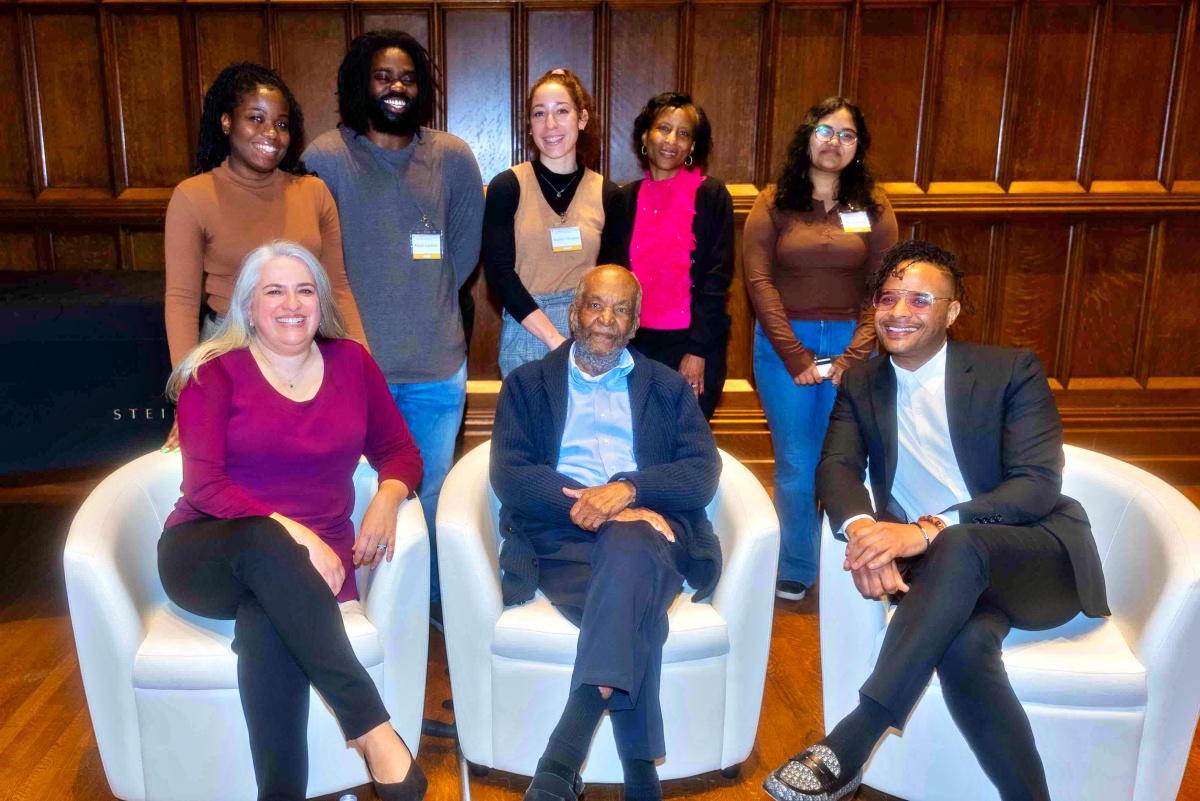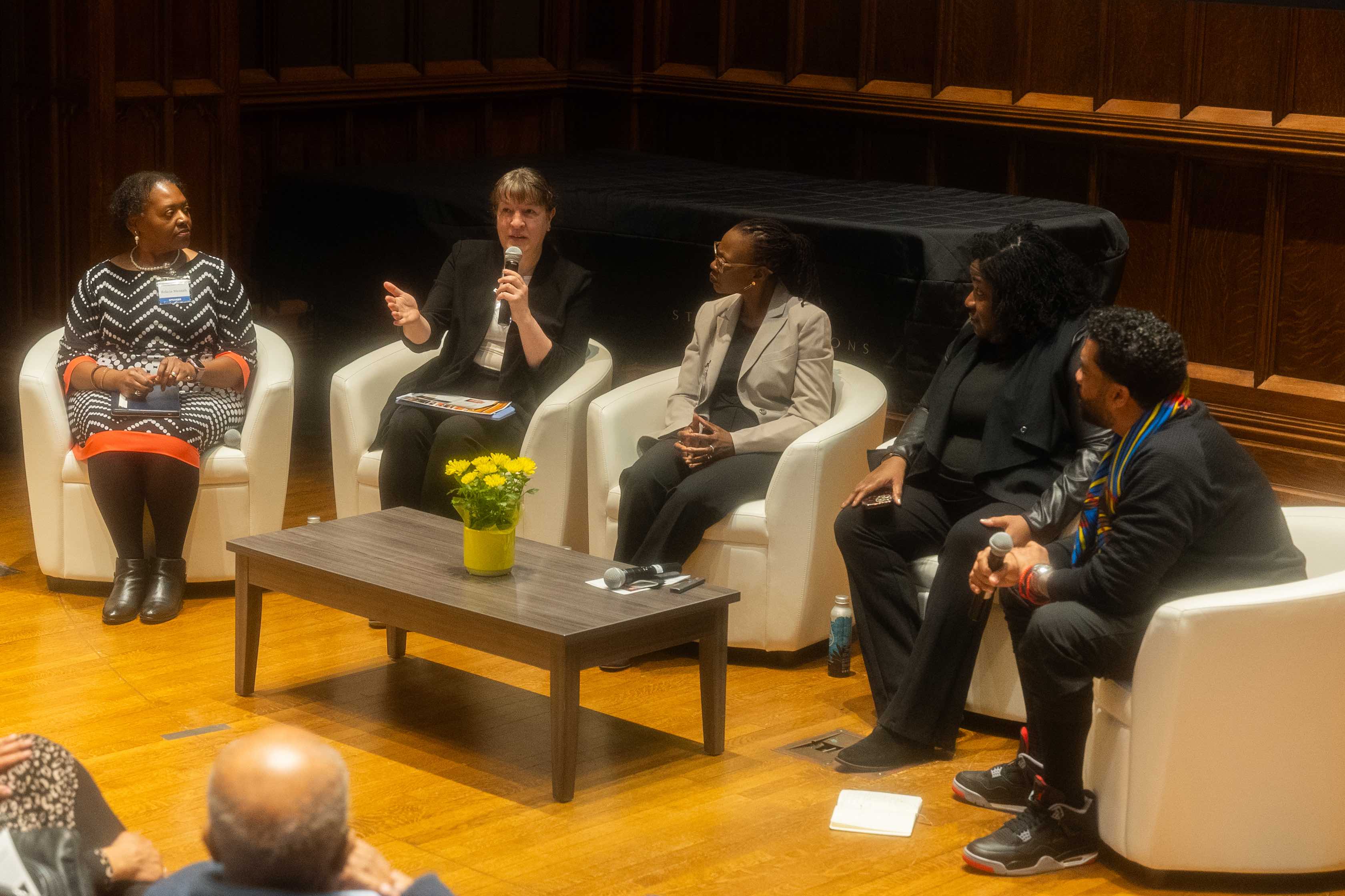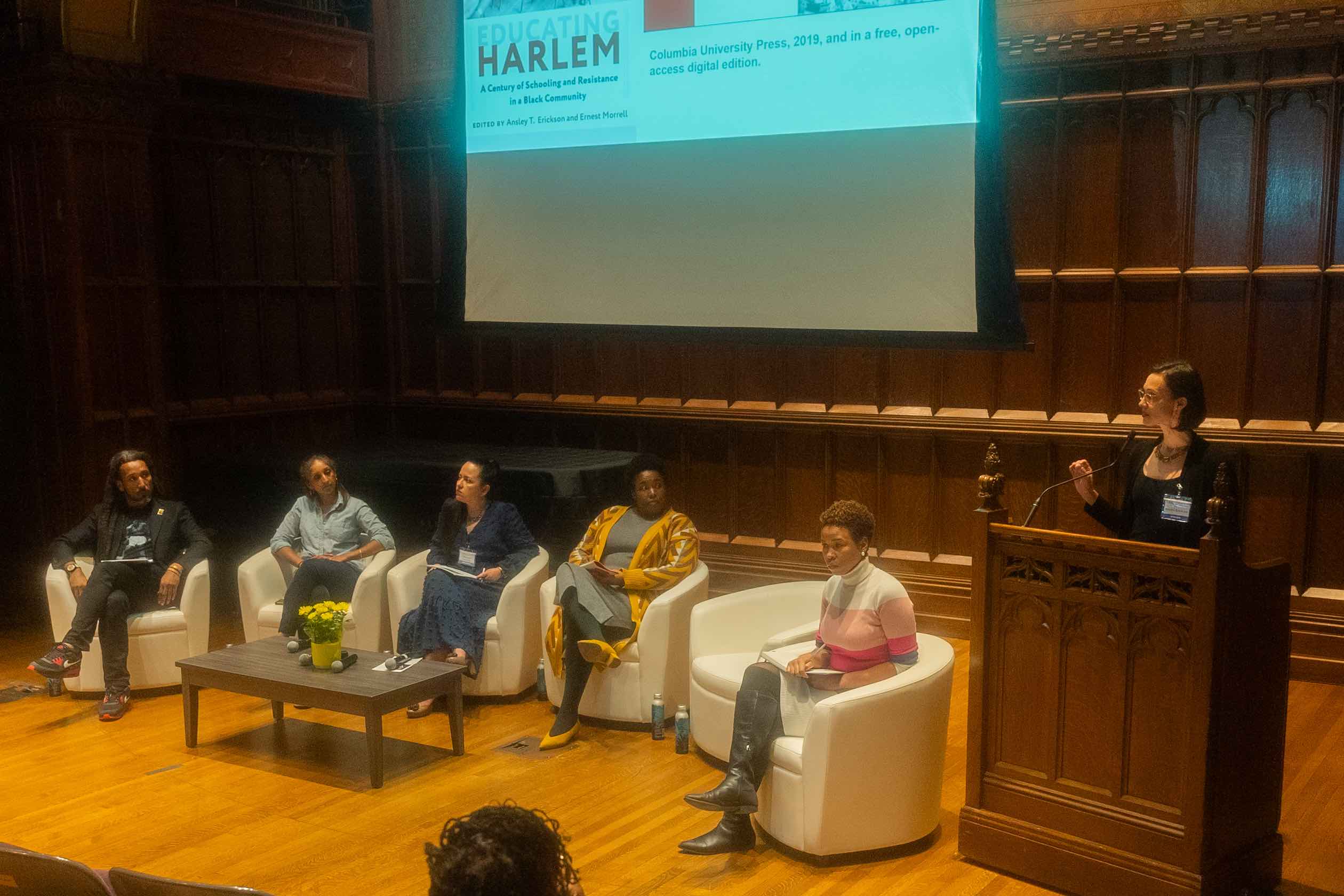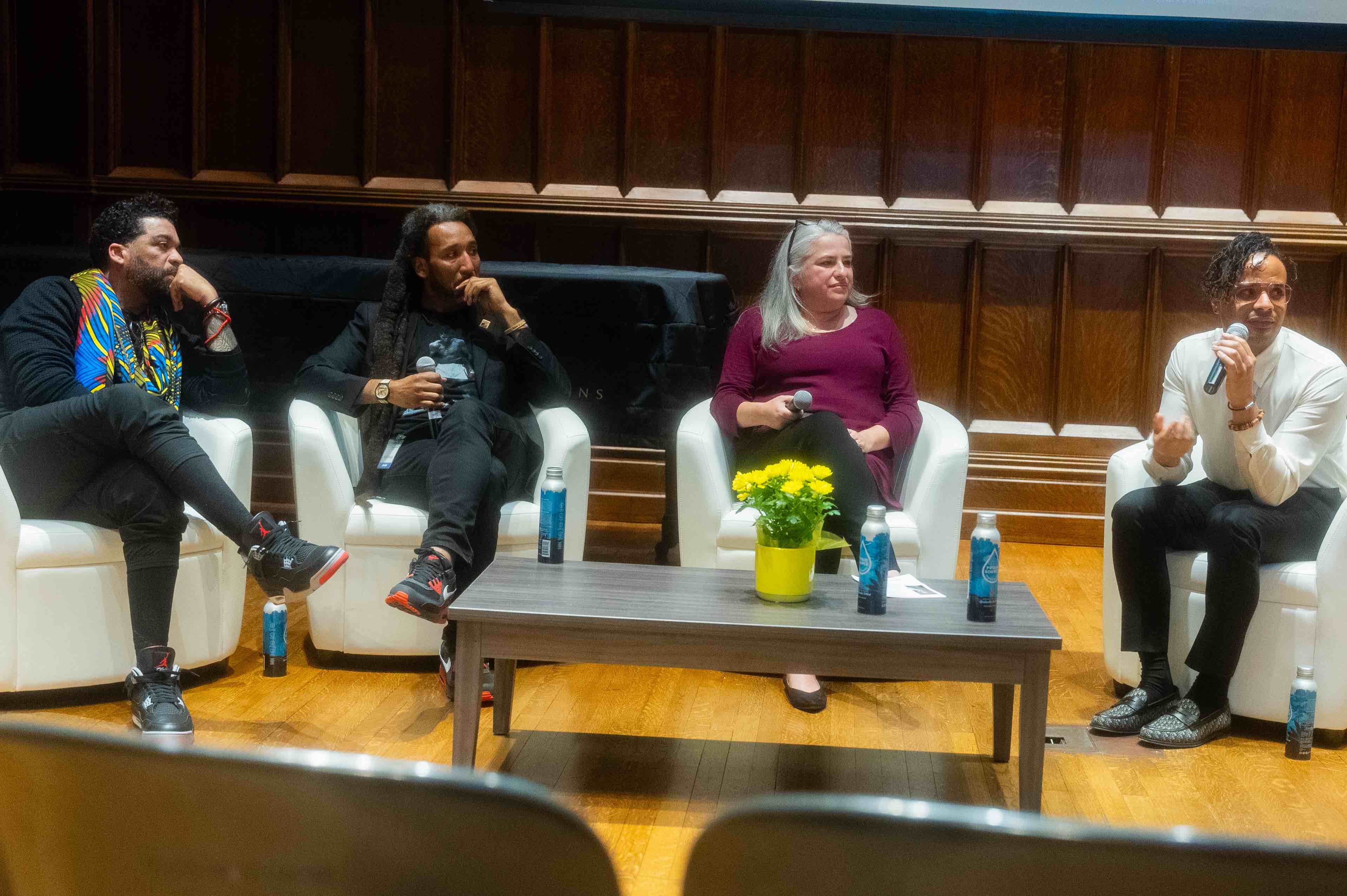The world-renowned Edmund W. Gordon Institute for Urban and Minority Education at Teachers College, Columbia University celebrated 50 years of pursuing transformative education as the first and among the most influential organizations devoted to education equity. At a day-long event on March 27, “50 Years of Effecting Equity in Urban and Minority Education,” the TC Gordon Institute presented a bold vision for the future including its new identity as the Edmund W. Gordon Institute for Advanced Study.
“The renaming symbolizes our steadfast commitment to driving equity and transformation in education, showcasing our dedication to critically examining and reshaping the lives of socially precarious, subjected and racialized communities,” said Gordon Institute Director Ezekiel Dixon-Román, Professor of Critical Race, Media and Educational Studies. “Building upon the solid foundation laid over the last 50 years, we are now poised to propel forward, tackling ongoing challenges faced by uprooted, racialized, subjected and dispossessed communities with transformative solutions.”
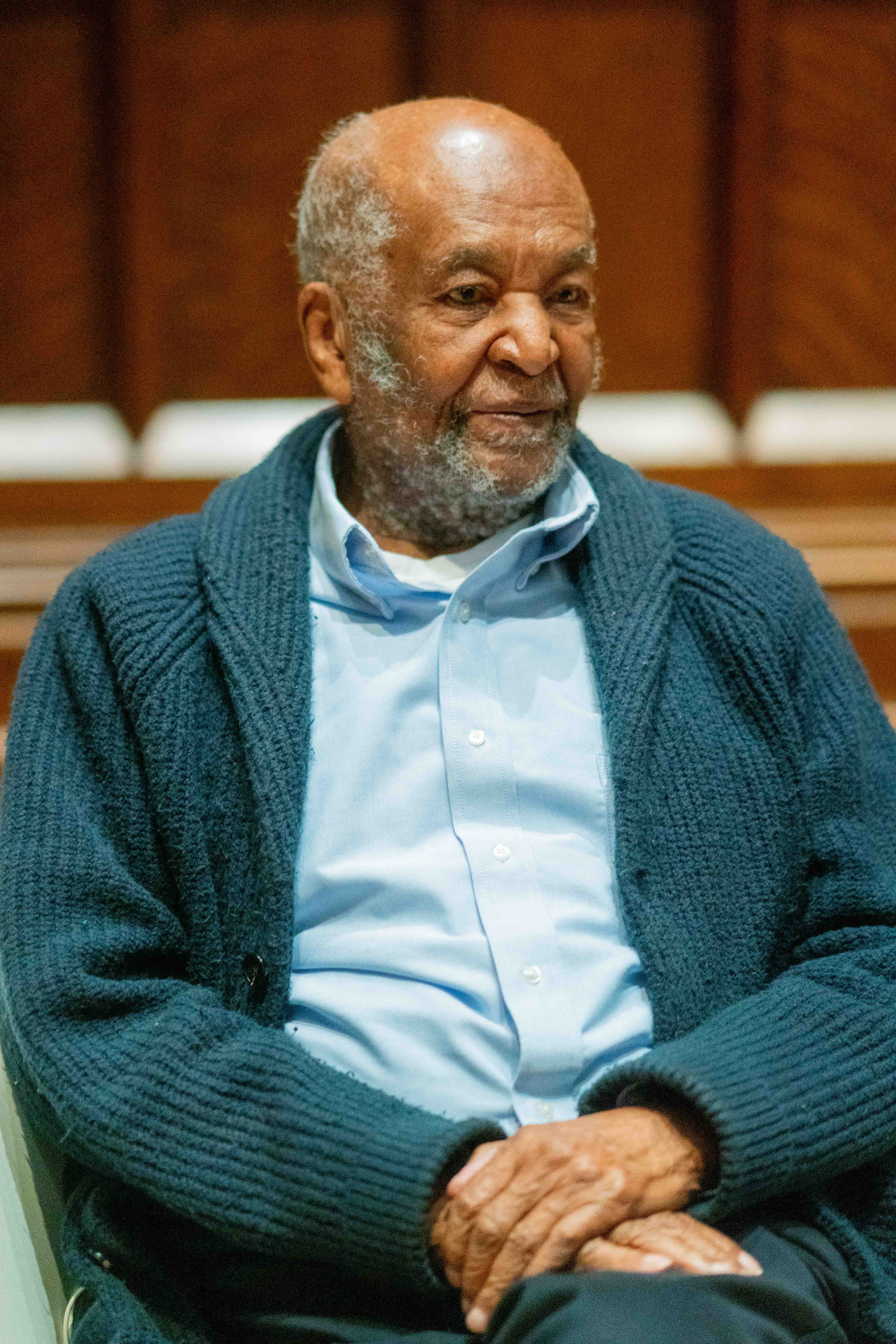
Richard March Hoe Professor Emeritus of Psychology and Education, Edmund W. Gordon (Photo courtesy of the TC Gordon Institute)
Founded by the esteemed Edmund W. Gordon, Director Emeritus and Richard March Hoe Professor Emeritus of Psychology and Education at Teachers College, the Gordon Institute maintains its dedication to advocating for marginalized communities through research, practice and policy. Throughout its history, the Institute has served as a dynamic, resilient center for innovation and interdisciplinary exploration, making a profound impact on countless lives.
“As TC continues to evolve to meet the changing needs of our fields in education, health and psychology and meeting the moment of what is arguably among the most challenging times of our history, the work of the Institute is as vital now as it was in 1973,” said President Thomas Bailey in his opening remarks for the celebration, which recognized the Institute’s half-century of profound service and scholarship.
The Edmund W. Gordon Institute for Advanced Study has long been at the forefront of critical educational inquiry, rooted in ensuring affirmative and equitable development and education for diverse, racialized populations and in urban communities. Over the last half century, the Gordon Institute has engaged in a broad range of foundational work including: building the U.S. Department of Education’s Education Resources Information Center (ERIC); cultivating supplementary and comprehensive education; leading in the affirmative development of academic ability; and forging equitable methods of assessment. Affiliated faculty have innovated in such areas as the REACH program, reducing school gun violence, racial literacies, the nation’s first black studies curriculum and curriculum with the Lenape people, the cultural studies of hip-hop, STEAM education and critical examinations of AI, among others.
Now, under the leadership of Dixon-Román and with a new name, mission, bylaws, structure and advisory board, the Gordon Institute will continue to champion transformative and field-defining scholarship while nurturing change agents and preparing abolitionists for a more just and equitable society. The new direction will focus on interrogating power structures, decolonizing education, and community-centered liberation.
The work of the Institute is as vital now as it was in 1973." - President Thomas Bailey
Restructured under three pillars — research, schools and community engagement, and academic programming — the TC Gordon Institute’s vision for the future reaffirms its commitment to reimagining pedagogy, rethinking assessment, impacting youth lives, and counter-narrativizing the history of education. By harnessing cross-cutting research on innovative and critical methods and critically analyzing the role of AI, the Gordon Institute will draw on the legacy of its past 50 years while pursuing curiosity- and critically-driven knowledge production to construct alternative systems of equity and empowerment in support of socially precarious and racialized populations.
The 50th anniversary celebration included lectures from Dixon-Román on transforming systems of equity and the future of education and Barry Goldenberg (Ph.D. ’19) on the history of the Institute, as well as a heartfelt tribute to its founder, Edmund W. Gordon (Ed.D. ’57), who was present at the event. Facilitated by Paola Heincke, Project Director at the Gordon Institute, Professors Ezekiel Dixon-Román, Malik Boykin, and David Wall Rice — the self-professed “intellectual grandchildren of Professor Gordon” — shared tearful stories about how they met Director Emeritus Gordon and the ways in which his guidance shaped, and continues to shape, their careers.
Panels also explored radically transforming pedagogy, curriculum, and assessment, as well as work that positively impacts youth lives and countering dominant narratives of the history of education — featuring scholars from across Teachers College, including Yolanda Sealey-Ruiz, Rachel Talbert, Felicia Mensah, Sonali Rajan, Limarys Caraballo, Ansley Erickson and Davinia Gregory-Kameka.
“The work of deconstructing, reimagining and rebuilding educational systems to foster liberation and equity for marginalized communities remains as critical as ever,” explained Vice President for Academic Affairs, Provost and Dean of the College KerryAnn O’Meara. “We look forward to the next chapter of the Edmund W. Gordon Institute for Advanced Study with its new structure designed to promote creative thinking and solutions.”
In this exciting new phase, the TC Gordon Institute is ready to strengthen and launch new transformative initiatives. By partnering with research programs focused on assessment innovation, the institute aims to advance the concept of assessment in the service of teaching and learning in ways that better serve students and teachers. Additionally, the institute will explore the creation of a new field of research and practice to prioritize the diverse ways of knowing and know-how in the design and use of technology and AI. The institute also plans to revamp its education-focused summer institute, providing a collaborative space for educators to develop anti-racist strategies addressing challenges in today's educational landscape. Lastly, the institute will strengthen community connections through partnerships with local Harlem schools of Community School District 5, fostering support networks and resources to empower all students. The new name and direction reflect feedback and input from consultation with a broad range of stakeholders.
As part of its restructuring, the Gordon Institute proudly introduced its newly constituted Advisory Board, composed of renowned thought leaders dedicated to forging pathways toward equitable education. Under the leadership of Dixon-Román, the Advisory Board will provide guidance and advice to steer the Institute's mission forward and drive meaningful change.
Upon its founding, the Gordon Institute was one of the first and most influential organizations devoted to empowering Black communities and other marginalized groups through advocacy, demonstration, evaluation, information dissemination, interdisciplinary research and technical assistance.
In its first 50 years, it co-developed the first-ever Advanced Placement seminar to offer African diaspora content; expanded the Education Resources Information Center (ERIC) Clearinghouse on Urban Education and served as a repository for relevant research; and developed bilingual and multicultural curriculum for the Head Start program in the ’80s, which was then disseminated around the country.
“Head Start, urban education, minority education, comprehensive education, affirmative development, assessment in the service of teaching and learning…all of these specific programs that I’ve tried to develop through the Institute for Urban and Minority Education really are about one thing and that's increasing the opportunities to learn for our disadvantaged kids,” said Edmund W. Gordon, founder and Director Emeritus of the newly renamed Edmund W. Gordon Institute for Advanced Study. “How proud I am of the Institute that I started, which is now led by one of my brightest students. I am very enthusiastic about the direction in which Professor Ezekiel Dixon-Román is taking the Institute and I am confident that despite the difficult times we live in, the Institute under his leadership will continue to affect change in the lives of those who need it the most.”
In 2021, Teachers College renamed the institute in honor of its founder, the Richard March Hoe Professor Emeritus of Psychology & Education, on the eve of his 100th birthday. Throughout his career, Gordon helped create the federal Head Start Program; has championed a holistic, “supplementary education” approach that laid the groundwork for efforts such as the Harlem Children’s Zone; and, from 2011-13, chaired a commission on the future of assessment in education supported by the then president of ETS, Kurt Landgraf.
After 50 years of pursuing equity and building community, the work the Gordon Institute supports is still as essential as it was during its founding era. “There is a critical role for the Institute to play at the College,” said President Thomas Bailey. “It is about addressing educational equity for racialized and socially precarious populations, it is about pushing boundaries, continuing the Institute's path-breaking legacy and field-defining scholarship…as we consider the future of education.”
